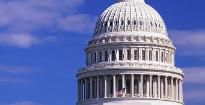House Votes Against Clean Debt Limit Hike
The House overwhelmingly voted down an unconditional increase to the $14.3 trillion debt limit Tuesday, as the Republican majority delivered a symbolic rebuke to President Obama ahead of a meeting at the White House.
The vote was 318-97, with 82 Democrats joining every Republican in rejecting legislation that would have authorized $2.4 trillion in additional borrowing by the federal government. Seven Democrats voted present on the legislation.
House Republicans scheduled the vote, which occurred after the close of the American markets, to demonstrate to Senate Democrats and the White House that Congress would not increase the debt limit without significant spending cuts and reforms.
The lopsided result was expected after Vice President Biden began bipartisan negotiations on a long-term debt-reduction plan, essentially acceding to the GOP demand that an increase in the debt ceiling be paired with fiscal reforms.
In an unusual twist, the chairman of the House Ways and Means Committee, Rep. Dave Camp (R-Mich.), sponsored the bill only to oppose it.
“This vote, a vote based on legislation I have introduced, will and must fail,” Camp said in a floor speech. “Now, most members aren’t happy when they bring a bill to the floor and it fails, but I consider defeating an unconditional increase to be a success, because it sends a clear and critical message that the Congress has finally recognized we must immediately begin to rein in America’s affection for deficit spending.”
The bill put House Democrats in an awkward position after 114 members of the caucus signed a letter by Rep. Peter Welch (D-Vt.) calling on Republicans to bring a “clean” debt-limit measure to the floor. Many of those Democrats reversed themselves when it became clear that Republicans were granting their request only to see the legislation fail.
Hours before the vote, Minority Whip Steny Hoyer (D-Md.) said he was advising Democrats to oppose the measure to avoid political attacks from Republicans. Members, he said, should not “subject themselves to a political 30-second ad attack.”
“My advice to them would be not to play this political charade,” Hoyer said at his weekly press briefing.


